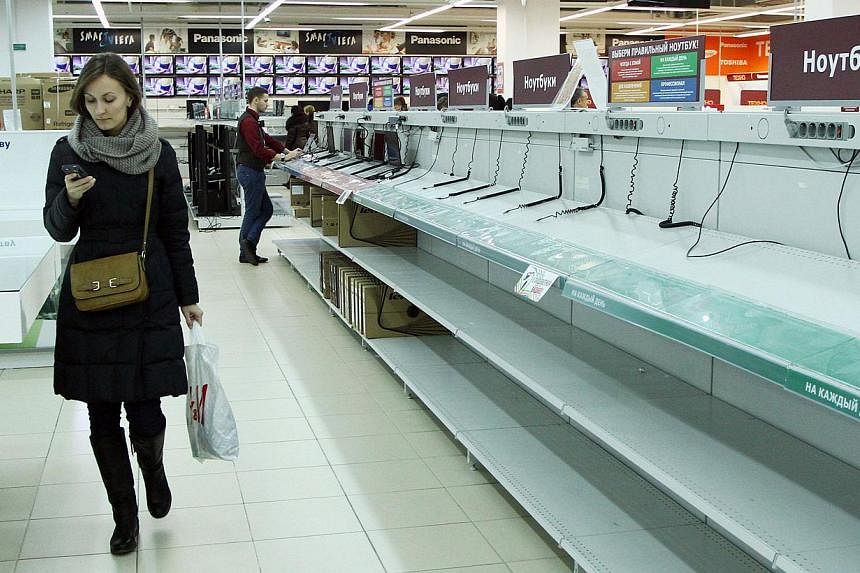MINSK (AFP) - Belarus blocked online stores and news websites Sunday, in an apparent attempt to stop a run on banks and shops as people rushed to secure their savings.
The Belarussian currency was dragged down by the slide of the Russian rouble last week, leading authorities to impose draconian measures, forbid price increases even for imported goods, and warn people against panic.
In a statement Sunday, BelaPAN news company, which runs popular independent news websites Belapan.by and Naviny.by, said that the sites were blocked Saturday without any warning.
"Clearly the decision to block the IP addresses could only be taken by the authorities because in Belarus the government has a monopoly on providing IPs," it said.
Other websites blocked Sunday were Charter97.by, BelarusPartisan.org, Udf.by and others with an independent news outlook.
The blockage started on December 19, when the government announced that purchases of foreign currency will be taxed 30 percent and told all exporters to convert half of their foreign revenues into the local currency.
"Looks like the authorities want to turn light panic over the fall of the Belarussian ruble into a real one," Belarus Partisan website wrote, calling the blockages "December insanity."
Internet shopping websites were also blocked en masse. Thirteen online stores were blocked Saturday for raising their prices or showing them in US dollars, deputy trade minister Irina Narkevich said, Interfax reported.
The government announced a moratorium on price increases for consumer goods and ordered domestic producers of appliances to "increase deliveries" and keep prices the same at the risk of their management being sacked.
The Belarussian rouble has lost about half of its value since the beginning of the year, having been hit hard by the depreciation of the Russian rouble since its economy is heavily dependent on its giant neighbour.
President Alexander Lukashenko last week complained that Belarus has "lost about a billion dollars" due to the rouble's slide, announcing a period of strict frugality starting with the new year.
"Everything depends on the people," he said, warning people not to "rush like crazy" to exchange savings. "For us it's important not to jump after Russia into the abyss," he said.
Lukashenko was in Kiev on Sunday to revive efforts to host talks on the Ukrainian conflict. But a high-ranking Ukrainian official said the Belarussian president was equally keen to use the trip to build bridges to Europe that ease his dependence on an increasingly isolated Russia.
- Shopping spree -
Belarussians queued for up to four hours to clear out their bank accounts and swept store shelves to secure their savings, stocking up on foreign-made appliances and housewares.
Some ATM machines even ran out of Belarussian roubles as people feared that banks were preparing to block bank cards or introduce caps on cash withdrawals.
At the central department store in the capital, people lined up to unload their savings and buy anything from televisions to fondue sets.
"Me and my wife always argue over what to watch so we're buying a second television. And the washing machine, how could we resist?" said a shopper who introduced himself as Ivan, as he waited for his wife to finish queueing for small appliances.
"We have to do something with these Belarussian roubles," said a teacher named Alla, eyeing an expensive multi-cooker.
In the bedding aisle, stock was completely sold out. "It makes sense, the new shipment we received cost us 30 percent more," said department manager Alla Sukhinina.
With foreign currency swiftly depleted in exchange offices, Belarussians even launched a black market website, dollarnash.com, where individuals can buy and sell dollars and euros.
While the central bank's exchange rate on Sunday was 10,900 roubles to the dollar, rates on the website were up to 17,000.

